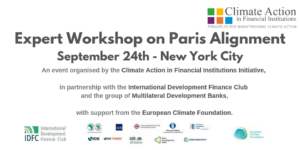Expert Workshop on Paris Alignment – New York City
Conferences - By : Alice PAUTHIER

On the sidelines of the UN Climate Action Summit, I4CE as the Secretariat of the Climate Action in Financial Institutions Initiative is organizing an Expert Workshop on Paris Alignment in partnership with the International Development Finance Club (IDFC) and the group of Multilateral Development Banks (MDBs) with support from the European Climate Foundation (ECF).
The topic of ‘Paris Alignment’ is a key area of focus of climate and sustainable investment and finance-related discussions in 2019. Institutions of all types are taking commitments and developing approaches to align their activities with the objectives of the Paris Agreement.
This event is part of a series of workshops started at COP24 in Katowice and followed by discussions sessions in June 2019 in Bonn – as well as within the Climate Action in Financial Institutions Initiative. These workshops brought together experts, financial sector practitioners and other public and private stakeholders to exchange on emerging research and approaches to date on the topic. This includes the Supporting Institutions of the Climate Action in Financial Institutions Initiative, members of the IDFC, the group of MDBs, commercial financial institutions, government agencies and representatives – as well as research centers, think-tanks and NGOs.
The New York workshop aimed to foster exchanges on the growing body of research, expertise and approaches on Alignment with the objectives of the Paris Agreement and more broadly the Sustainable Development Goals (SDGs). Financial institutions – including the MDBs, IDFC members and commercial institutions shared current progress and present how the background research they have conducted has informed their emerging frameworks for alignment. It also provided the opportunity to identify the key questions, points of convergences and potential divergences today as they move forward with their roadmaps and strategies for alignment with the Paris Agreement. Discussions will be followed up to COP25 in December and into 2020.
To help frame discussions, the event included the launch of an independent two-part study produced by I4CE and the Climate Policy Initiative (CPI). This study presents a framework for defining what the process of ‘Paris Alignment’ requires as well as insights and recommendations on how development finance institutions can build on existing climate mainstreaming efforts to align their activities from today. The study was conducted with support from the International Development Finance Club (IDFC) and the European Climate Foundation (ECF).
More about the event on Climate Action in Financial Institutions Initiative website.